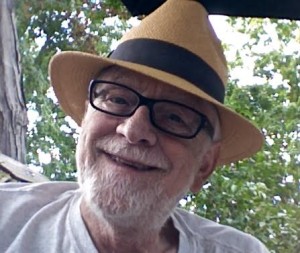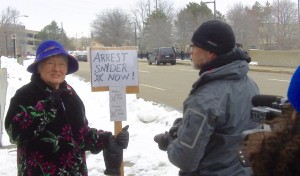
Columnist Robert Thomas
By Robert R. Thomas
The plan was to take a list of ten events surrounding the Democratic debate at the Whiting and participate in as many as chilly weather and aging bones permitted. My wife Ingrid and I were more interested in the scenes surrounding the main event than the debate itself. We were also interested in participating, not just observing.
The opening event was a 2 p.m. rally held by #JUSTICE4FLINT at Willson Park followed by a march across the river, an iconic Flint racial divide.
As befits elders, we arrived fashionably late. By then the protestors had marched from Willson Park across the river and were returning when Ingrid and I caught up with them at the foot of the Harrison Street bridge. What the group lacked in numbers, it made up for with youthful energy. Chants of “Strength in Numbers” and “Justice for Flint,” and “Wake Up, America” rolled over the bridge toward us.
A gaggle of photojournalists tagged along with the protestors. Both groups represented a mix of sexes, races and ages, a large percentage of them young adults. As they passed, several journalists peeled off from the march, their attention caught by an older woman standing alone at the base of the bridge with her protest sign. They encircled the woman with their curiosities and cameras and microphones.
The woman is my wife, a fierce Flint resident since 1952. When it comes to living in Flint, she is the real deal and one of Flint’s finest ambassadors. She sold me on living in Flint instead of high on a hill in San Francisco where I had been perfectly happy for 37 years. It doesn’t get any more effective than that in my world.
But as I stepped back to the perimeter of the scene, I saw the lovely and gracious Ingrid exhibit another side, a fiercer side and a sadder side. I watched my lovely wife morph from an ambassador into a fighter. She had become a Gray Panther protecting her home.
The Gray Panthers organization was formed in 1970 by Maggie Kuhn who had been forced to retire from her job at 65 because that was her employer’s mandatory retirement age. Maggie organized to found the Gray Panthers, what is often labeled an “elder rights” organization. But the organization’s initial title was “the Consultation of Older and Younger Adults for Social Change.” That accurately described the diverse group surrounding my wife.
A comment to the inquiring journalists summed up her new Gray Panther militancy: “We came here as refugees and Flint gave us a good life. For this community to be so mistreated, it’s just…it’s just wrong. I have never been this upset in my whole life.”
Ingrid’s family fled Germany in the aftermath of World War II and her father eventually worked for many years as an engineer at AC Spark Plug. The family was sponsored by a Flint church, installed in a furnished house, and for years were active participants in the International Institute. She has never forgotten the kindness extended to her and her family by the community.

Ingrid was not the only one weeping in this gathering of kindred spirits surrounding her and supporting her. This was real time Flint without CNN.
We understood that day that there is an underlying rage against those who allowed the poisoning of our public water and our trust, those who poisoned the babies. This is something Flintoids will never forget, nor should they lest it ever happen again. Fool us once, but never again. Militant vigilance has supplanted trust here in the village. What we trust is what we have seen our government do.
From the river we went to Woodside Church for a showing of a documentary film, “Here’s to Flint,” which focuses on the water crisis and its history to date.
The company was welcoming and diverse like the #JUSTICE4FLINT gathering. Woodside Church offered the perfect sanctuary in which to gather with Water Warrior activists and their supporters. It was a real village people gathering to support one another.
Pastor Deborah Conrad set the tone with her warm welcome to all. “We are pleased to be part of this event and the movement for justice in Flint and throughout the state.”
She promised pizza and some rabble-rousing to follow.
Claire McClinton of the Flint Democracy Defense League introduced the film, an ACLU of Michigan production by Kate Levy and Curt Guyette, by saying, “This is a celebration of what the people united together can accomplish.”
McClinton appears in the film, which concludes with her saying, “Stay tuned. This story is not over. They poisoned the wrong city.”
That fierce Flint theme continued throughout the comments following the film by several Water Warriors like Melissa Mays and Lee Anne Walters [Walters came back from her new home in Virginia for the epic weekend] along with their supporters like Guyette and Levy and Nayyirah Shariff, also with the Flint Democracy Defense League.
Mays spoke of the “amazing friendships, amazing tutors” among the Water Warriors. She cautioned “people need to pay attention to what has happened here….Take a look at these cities where somebody decided that in order to solve a budget problem, it’s okay to suspend democracy for a while.”
She concluded her remarks with “We are going to be a shining example of what happens when citizens have had enough. We don’t have to put up with it.”
Lee Anne Walters said the film “highlights what we have been going through.” She urged all to push hard for the health care plan for the poisoned children.
Nayyirah Shariff spoke to the issue of justice, which she said to her looks like accountability and reparations. The damage is severe; so should be the accountability, she asserted.
Kate Levy advised all activists to document everything. She described the film as “the people’s documentation.”
Curt Guyette, the investigative journalist for the ACLU of Michigan who was reporting this story early on in the crisis, described how “the truth came out.” He spoke of the diversity of the group of activists and citizen journalists who initiated the pushback to a public poisoning. He described the uprising as “a community-driven action.”
Guyette echoed Walters’ plea for serious attention to getting the children help as soon as possible. He also echoed Shariff’s call for a justice of accountability and reparations, and, if called for, prosecution. His conclusion: “We see what happens when democracy is taken away from us.”
Spent from an emotional day, Ingrid and I headed to our favorite downtown restaurant, Cork, for sustenance and a beverage or two before heading home to watch the debate.
Not long after the debate concluded, our doorbell rang to announce the arrival of our two young neighbors who had gotten into the Whiting for the debate. This rendezvous had been arranged beforehand to compare our notes from a very busy day in Flint. And so we did late into the night, village people telling stories to each other.


You must be logged in to post a comment.